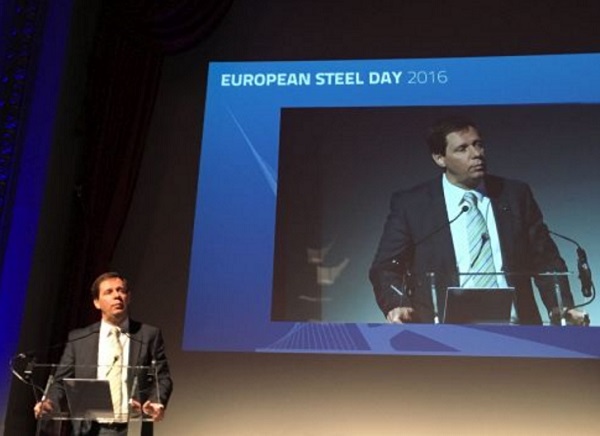
ArcelorMittal's Geert van Poelvoorde has come forward in support of Europe's steel industry, describing it as a "truly world-class" sector whose "steel mills are the benchmark for global industry excellence and productivity".
Speaking on European Steel Day, ArcelorMittal's executive vice president and CEO echoed the words of European Commission Vice-President, Kyrki Katainen, at an extraordinary meeting of European Economy Ministers held last month, by calling for the greater use of trade defence instruments.
"We are the cornerstone of the manufacturing sectors in many EU member states, with an annual turnover worth an estimated 1.3% of EU GDP," Geert van Poelvoorde argued in his capacity as President of Eurofer. "Investment in steel is also one of the main multipliers in the economy. Every Euro of demand for steel products created additional demand worht €3.1 to society, of which €2.1 goes to other suppliers."
Mr. Van Poelvoorde acknowledged the obstacles faced by Europe's steel industry, which has seen a 7,000 decrease in steelworkers since last autumn and over 85,000 jobs lost in total since 2008. A leading global steel and mining manufacturer, ArcelorMittal has not been exempt from the troubles and its Europe branch experienced its first operating loss in 7 quarters in November 2015.
At the informal council of March 2016, Luxembourg Deputy PM and Minister of the Economy, Étienne Schneider, called for actions to be established with partners such as China, India and Russia in a bid to address the origins of the global oversupply affecting steel market prices - an argument reiterated by Mr Van Poelvoorde.
"Fundamentally the steel industry today is faced with a very low-price environment, largely caused by overcapacity in China," he remarked. "As a result of declining domestic demand, China's overcapacity is around 400 million tonnes. China's excess steel production is being exported into the international markets. The EU market has proved particularly vulnerable compared to other regions, with a surge of over 120% in imports from China since 2013."
He dismissed similarities between the crises in the steel and banking industries, saying that a bail-out did not form part of steel manufacturers demands but rather that the sector was being dealt a blow by "decisions or legislation that hand an unfair advantage to competitors in other markets, putting their own industry at risk".
Speaking on behalf of Eurofer, Mr. Van Poelvoorde criticised the EU's slow response in introducing final measures and its low level of tariffs compared to other markets, refuting the argument that raising trade tariffs held the potential to damage Europe's downstream industries.
"There are some who claim that the implementation of trade tariffs in-line with WTO legislation could put the downstream manufacturing industry at risk or out of business. They acknowledge that the steel industry employs hundreds of thousands of people but argue it is better to re-train those people and invest in industries that have a stronger future," he explained, before adding: "I strongly disagree. Europe must have its own steel industry to satisfy the requirements of sectors that are important to the future of European manufacturing. Those who say having access to cheap steel is the top priority are enormously underestimating the value of steel. You can’t just buy quality steel from your local store."








